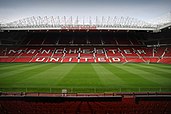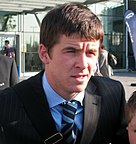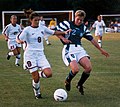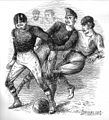Portal:Association football
| Main page | Categories & Topics | WikiProjects & Things you can do |
The Association football portal

Association football, more commonly known as football or soccer, is a team sport played between two teams of 11 players each, who primarily use their feet to propel a ball around a rectangular field called a pitch. The objective of the game is to score more goals than the opposing team by moving the ball beyond the goal line into a rectangular-framed goal defended by the opposing team. Traditionally, the game has been played over two 45-minute halves, for a total match time of 90 minutes. With an estimated 250 million players active in over 200 countries and territories, it is the world's most popular sport.
The game of association football is played in accordance with the Laws of the Game, a set of rules that has been in effect since 1863 and maintained by the IFAB since 1886. The game is played with a football that is 68–70 cm (27–28 in) in circumference. The two teams compete to get the ball into the other team's goal (between the posts, under the bar, and across the goal line), thereby scoring a goal. When the ball is in play, the players mainly use their feet, but may use any other part of their body, except for their hands or arms, to control, strike, or pass the ball. Only the goalkeepers may use their hands and arms, and only then within the penalty area. The team that has scored more goals at the end of the game is the winner. There are situations where a goal can be disallowed, such as an offside call or a foul in the build-up to the goal. Depending on the format of the competition, an equal number of goals scored may result in a draw being declared, or the game goes into extra time or a penalty shoot-out.
Internationally, association football is governed by FIFA. Under FIFA, there are six continental confederations: AFC, CAF, CONCACAF, CONMEBOL, OFC, and UEFA. Of these confederations, CONMEBOL is the oldest one, being founded in 1916. National associations (e.g. The FA or JFA) are responsible for managing the game in their own countries both professionally and at an amateur level, and coordinating competitions in accordance with the Laws of the Game. The most senior and prestigious international competitions are the FIFA World Cup and the FIFA Women's World Cup. The men's World Cup is the most-viewed sporting event in the world, surpassing the Olympic Games. The two most prestigious competitions in European club football are the UEFA Champions League and the UEFA Women's Champions League, which attract an extensive television audience throughout the world. Since 2009, the final of the men's tournament has been the most-watched annual sporting event in the world. (Full article...)
Selected article
The ground, given the nickname the Theatre of Dreams by Bobby Charlton, has been United's permanent residence since 1910, with the exception of an eight-year absence from 1941 to 1949, following the bombing of the stadium in the Second World War. During this period, the club shared Maine Road with local rivals, Manchester City. The ground underwent several expansions in the 1990s and 2000s, most notably the addition of extra tiers to the North, West and East stands which served to return the ground almost to its original capacity of 80,000. Future expansion is likely to involve the addition of a second tier to the South Stand, which would raise the capacity to over 90,000. The stadium's current record attendance was recorded in 1939, when 76,962 spectators watched the FA Cup semi-final between Wolverhampton Wanderers and Grimsby Town. (Full article...)
Selected biography
Barton was raised in a rough area and as a child saw football as a form of escapism, he began his professional career in 2002 with Manchester City after working his way through their youth system. His appearances in the senior side gradually increased in regularity over a period of five years - he made more than 150 appearances for the club in total - which earned him his first cap for the England national team in February 2007, despite his criticism of some of the team's players.
His career has been marred by numerous controversial incidents and disciplinary problems, one of which being a fight with City team-mate Ousmane Dabo which led to him leaving the club. Barton has been described as a "tough tackler", a style reflected in the high number of fouls he has committed during his career: he received 39 bookings and three red cards during his time at Manchester City. He joined Newcastle United for a fee of £5.8 million in July 2007.
Outside of football, Barton is a patron of the Tamsin Gulvin Fund and also works with the 'Get Hooked on Fishing' campaign, designed to keep children out of trouble by getting them interested in fishing. (Full article...)
Selected association

Football Australia is the governing body of soccer, futsal, and beach soccer within Australia, headquartered in Sydney. Although the first governing body of the sport was founded in 1911, Football Australia in its current form was only established in 1961 as the Australian Soccer Federation. It was later reconstituted in 2003 as the Australian Soccer Association before adopting the name of Football Federation Australia in 2005. In contemporary identification, a corporate decision was undertaken to institute that name to deliver a "more united football" in a deliberation from the current CEO, James Johnson. The name was changed to Football Australia in December 2020.
Football Australia oversees the men's, women's, youth, Paralympic, beach and futsal national teams in Australia, the national coaching programs and the state governing bodies for the sport. It sanctions professional, semi-professional and amateur soccer in Australia. Football Australia made the decision to leave the Oceania Football Confederation (OFC), for which it was a founding member, and become a member of the Asian Football Confederation (AFC) on 1 January 2006 and ASEAN Football Federation (AFF) on 27 August 2013. (Full article...)
Did you know (auto-generated) -

- ... that goalkeeper Sophie Whitehouse, who has lived in England, Africa and the US, has been chosen to play soccer for the Republic of Ireland?
- ... that Ryan Roberts, a defensive end for Notre Dame, was a soccer player in high school?
- ... that Carlton Town F.C., now competing at the eighth tier of the English football pyramid, was once denied promotion by a hat-trick scored by future England international Jamie Vardy?
- ... that Ecuadorian footballer Hernán Galíndez won a bicycle for beating a team featuring Lionel Messi when they were children?
- ... that after his soccer career, Steve Palacios enlisted in the United States Army and played for the United States Armed Forces soccer team?
- ... that Welsh footballer Jon Morgan went on to become a college principal after retiring?
Selected image

Selected quote
General images -
Selected World Cup
| Pos | Grp | Team | Pld | W | D | L | GF | GA | GD | Pts | Qualification |
|---|---|---|---|---|---|---|---|---|---|---|---|
| 1 | B | 3 | 1 | 1 | 1 | 3 | 2 | +1 | 3 | Advance to knockout stage | |
| 2 | D | 3 | 1 | 1 | 1 | 3 | 2 | +1 | 3 | ||
| 3 | F | 3 | 0 | 3 | 0 | 2 | 2 | 0 | 3 | ||
| 4 | E | 3 | 1 | 1 | 1 | 2 | 3 | −1 | 3 | ||
| 5 | A | 3 | 1 | 0 | 2 | 2 | 3 | −1 | 2 | ||
| 6 | C | 3 | 1 | 0 | 2 | 2 | 3 | −1 | 2 |
Selected topic
More did you know -
- ... that Irish sportswoman Carol Breen has played internationally in both association and Australian rules football? (17 March 2021)
- ... that the 2020 EFL League Two play-off Final is believed to be the first competitive match played behind closed doors at Wembley Stadium? (13 January 2021)
- ... that the opening goal of the 1992 Football League Third Division play-off Final was described as a "Russian linesman job"? (28 February 2021)
- ... that, such was his popularity with the club's supporters, when footballer Hughie Ferguson was sold by Motherwell F.C., the local steel works closed to allow workers to wave him off? (31 March 2021)
- ... that Claude Callegari gained cult-hero status among English football fans for his speeches about Arsenal? (24 April 2021)
- ... that some of the Sheffield Wednesday team participated in a conga on the M4 motorway after winning the 2005 Football League One play-off Final? (19 February 2021)
Association football portals
More sports portals
Associated Wikimedia
The following Wikimedia Foundation sister projects provide more on this subject:
-
Commons
Free media repository -
Wikibooks
Free textbooks and manuals -
Wikidata
Free knowledge base -
Wikinews
Free-content news -
Wikiquote
Collection of quotations -
Wikisource
Free-content library -
Wikiversity
Free learning tools -
Wiktionary
Dictionary and thesaurus










































